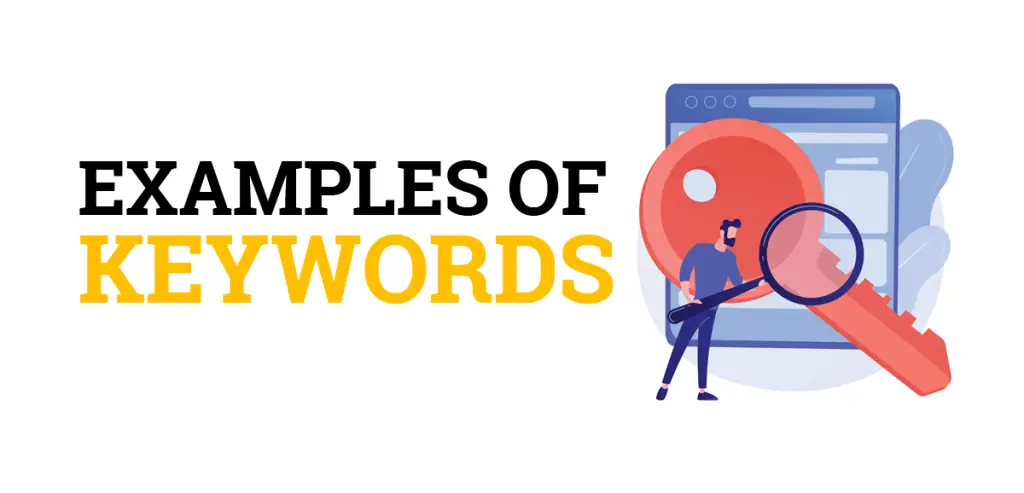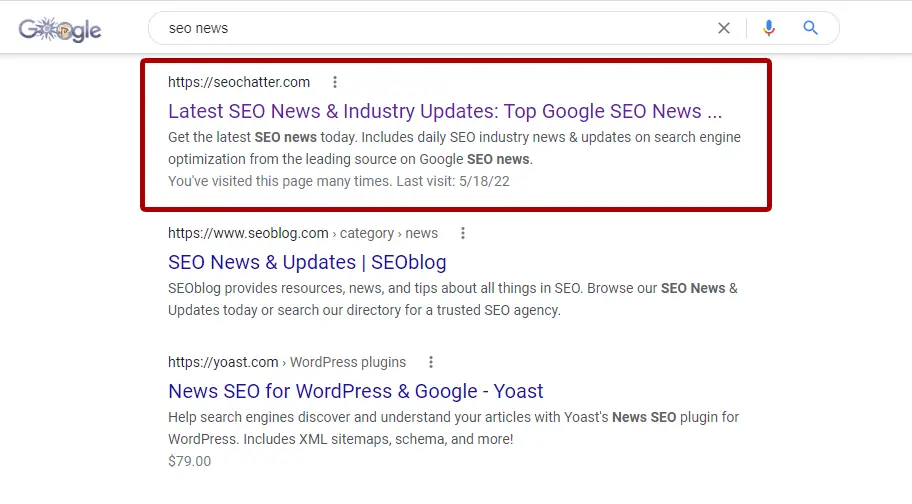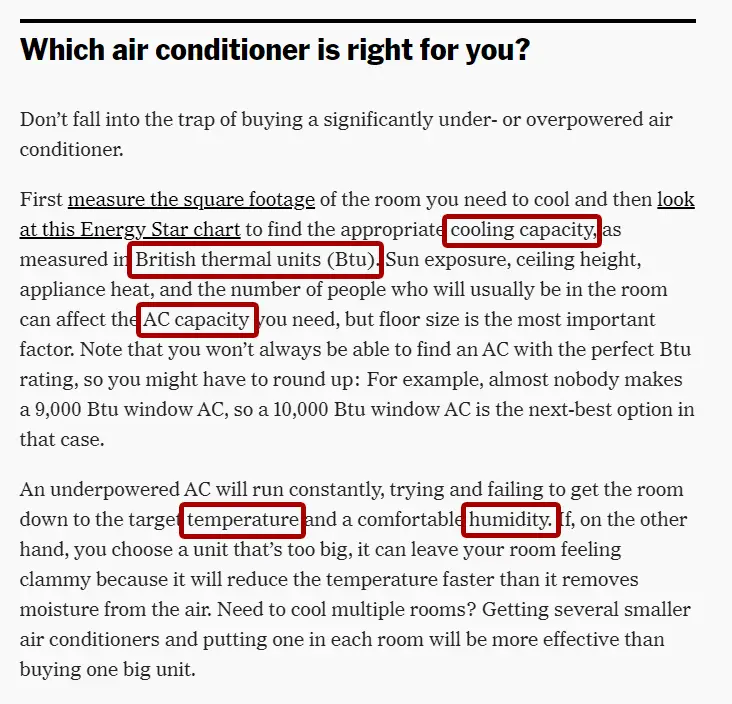In this article, you’ll find examples of keywords.
The ultimate goal here is to give you a list of good keyword examples and bad keywords so you know how to do better search engine optimization (SEO) for your website or blog.
The fact is there are many different types of keywords you can optimize your content for and this guide will show you the top SEO keyword examples you can use to improve your keyword research strategy and digital marketing efforts to rank higher on Google, Yahoo, and Bing.
What Are Keywords?
Keywords are the topics that define what your content is about and are used in your web pages to make it possible for people to find your content via search engines. Keywords are used for SEO to help improve the rankings for your content in the search engine results pages.

Examples of Keywords
Short-Tail Keywords
The first examples of keywords are short-tail keywords, which are words and phrases that are one to two words in length. A short-tail keyword for SEO has the highest search volume and the most competition; however, they’re also not well-targeted for conversions because the search intent can be ambiguous.
Examples of short-tail keywords include:
- dogs
- cat food
- Internet marketing
- books
- psychology
Medium-Tail Keywords
The next common SEO keywords example is medium-tail keywords, which are phrases that are three to four words in length. A medium-tail keyword has moderate search volume and average competition. These types of keywords in SEO and digital marketing are also more targeted than short-tail keywords because the user search intent is easier to establish and, therefore, has higher conversions.
Examples of medium-tail keywords include:
- dog that don’t shed
- cat food recipes
- Internet marketing strategies
- search optimization for beginners
- treadmill workout plan
Long-Tail Keywords
Long-tail keywords are the third type of keyword based on length. A long-tail keyword is five words or longer, has the lowest search volume, least competition, and very specific user search intent, making them good keyword examples to target for a fast increase in search engine rankings and website traffic. See my article on the advantages of long-tail keywords for more information on these kinds of keywords.
Examples of long-tail keywords include:
- dogs that are good with kids
- cat food that is safe for allergies
- why treadmills are bad for your knees
- how many keywords per page for SEO
- on-page vs off-page search optimization
Informational Keywords
Informational keywords are terms and phrases used to meet informational search queries in Google, Yahoo, and Bing. These SEO keywords typically start with “who”, “what”, “when”, “where”, “why”, “how”, “can”, “do”, and “does”, but don’t necessarily have to include those qualifiers.
Examples of informational keywords include:
- what is keyword optimization
- how do air conditioners work
- calories in a pizza
- next presidential election date
- why are frogs green
Transactional Keywords
Transactional keywords are used in SEO to attract visitors who are ready to purchase a product or service. These keywords have the strongest search intent for taking an action and are commonly known as buyer keywords. These types of keywords start with “best”, “top”, “buy”, “purchase” or include “for sale”, “to buy”, “near me”, or “review”.
Examples of transactional keywords include:
- best SEO agency
- top keyword research tools
- buy groceries online
- RVs for sale near me
- mountain bike for sale in Chicago
Navigational Keywords
Navigational keywords are keywords that people use in the search engines when they know what they want but are not exactly sure how to find it online. Common examples of navigational keywords are when a user is looking for a particular website, brand, or product to buy. They know it exists, but need the help of Google, Yahoo, or Bing to find the website, location, contact information, or product sales page.
Examples of navigational keywords include:
- Google Trends
- SEO Chatter website
- Pinterest login page
- Resume Genius
- Honey Bee’s florist
Organic Keywords
Organic keywords are a keywords that your website naturally ranks for in the search engine results pages (SERPs) to attract free traffic to your content from Google, Yahoo, and Bing. A single web page can rank for hundreds to thousands of organic keywords without the site owner having to pay for those rankings in the search engines. Find out more about what are organic keywords.
As you can see in the example image below, SEO Chatter ranks for the organic keyword phrase “SEO news” in Google’s search engine.

Pay-Per-Click Keywords
Pay-Per-Click (PPC) keywords are a form of online advertising where an advertiser pays money to have an advertisement appear in the SERPs for particular words or phrases. Bidding on a PPC keyword allows you to rank your website above the organic search results listings to instantly gain attention from your target audience without having to focus on SEO to acquire those top positions.
Trending Keywords
Trending keywords are terms that have a sudden increase in user interest and, therefore, higher search volume. A keyword trend typically has a short lifespan but can provide a large surge in website traffic if you optimize for it correctly and publish content fast enough to capitalize on the demand. See this related guide on how to find trending SEO keywords to learn more about this content publishing strategy.
Examples of trending keywords include:
- New Zealand vs Ireland rugby
- World Emjoi Day
- Resident Evil movie
- Petrol price
- Fourth of July
Evergreen Keywords
Evergreen keywords are SEO keywords that continue to stay relevant and fresh in the search engines. Content that’s optimized for evergreen keywords is beneficial over the long term because user interest remains high and continually attracts organic search traffic for the website.
Examples of evergreen keywords include:
- what is SEO
- how to put ads on a website
- affiliate marketing tips for beginners
- can a dog eat cat food
- do cars have air filters
Geo-Targeted Keywords
Ge0-targeted keywords focus on a specific location. These types of keywords are used for localized search results to attract visitors to a local business or storefront.
Examples of geo-targeted keywords include:
- Baltimore Maryland hotels
- Spas in Arizona
- Scuba diving instructor Philippines
- Utah Mexican restaurants
- BMW service center Roseville
Semantic SEO Keywords
Semantic SEO keywords are terms that are related conceptually to another word or phrase. Semantically related keywords include topics and entities that help search engines better understand the content outside of just crawling exact match keywords on the page.
Examples of semantic keywords for the term “air conditioner” would be “thermostat”, “British Thermal Units or BTUs”, “cooling capacity”, “temperature”, “humidity”, etc. A well-written piece of content based that demonstrates expertise on the topic would include those semantically related SEO keywords as you can see in this example image below.

Generic Keywords
Generic keywords are words that have a wide range of meanings. A generic keyword is often referred to as a short-tail keyword because they are one to two words in length and are not specifically defined for the user. See this related page on what are generic keywords.
Examples of generic keywords include:
- Antennas
- Baby monitors
- Cat toys
- Property management
- Wyoming
Exact Match Keywords
An exact match keyword is a term or phrase used in SEO and PPC campaigns that match the exact search query for a user. Exact match keywords can help a web page rank higher in the SERPs when optimize correctly for on-page SEO. They also restrict the search queries the PPC ad appears for in the SERPs only to the exact match keyword phrase and nothing else.
Phrase Match Keywords
A phrase match keyword is a term or phrase that includes the exact match keyword along with other words in the search query (e.g., before or after the target SEO keyword). For example, an ad that’s targeting the phrase “top SEO software” may also appear for search queries like “top SEO software for digital marketers”, “what are the top SEO software products”, and “top SEO software reviews”.
Partial Match Keywords
A partial match keyword is a phrase that matches some (or part) of the keyword you’re optimizing PPC ads for but not all of it. For example, an ad that’s targeting the phrase “SEO keyword research tools” may also appear for search queries like “keyword research tools”, “SEO tool for keywords”, and “keyword research”.
Broad Match Keywords
A broad match keyword is a word or phrase that allows your website or paid ad to show in the SERPs when a user searches for the exact keyword, variations of it, and other related topics. That means your web page or ad can appear for the most search queries regardless if it includes a specific keyword or not.
Branded Keywords
Branded keywords are phrases associated with your brand, products, and services. A branded keyword includes any query used in a search engine that includes the name of your company, business, or brand along with a product or service that the searcher is trying to find. Here’s another article on what are branded keywords to find out more about these types of search terms.
Examples of branded keywords include:
- SEO Chatter
- Nike Outlet
- Apple Airpods
- Costco Tire Center
- The Wire Cutter
Naked URL Keywords
Naked URL keywords are examples of SEO keywords used in link building where the hyperlink uses the URL address for the target web page instead of keyword-optimized anchor text. See this related guide on anchor text ratio optimization to find out how often you should use naked URLs in your backlinks.
Examples of naked URL keywords include:
- https://domain.com/page-title/
- https://domain.com/example-folder/page-title.html
Page Title Keywords
Page title keywords are keywords that use the target web page’s title in the anchor text for internal links or backlinks. The hyperlink includes the exact title of the target page for SEO purposes.
Examples of page title keywords include:
- Benefits of Long Tail Keywords (& Advantages for SEO)
- How to Check Keyword Ranking In Google (Complete Guide)
- Why Is Keyword Research Important for SEO?
- How to See Keywords In Google Analytics: Track & Check Rankings
- What Are Meta Keywords? Are Meta Keywords Important for SEO
Negative Keywords
Negative keywords are words and phrases used in pay-per-click (PPC) campaigns that allow you to exclude specific search terms from your Google Ads to help your advertisements only appear for search queries that matter most to your customers. In other words, a negative keyword prevents your ads from appearing in the search engines for a certain word or phrase so you don’t pay for unrelated impressions or low-quality clicks.
Focus Keywords
Focus keywords are the terms you want a web page to rank the most for in the search engines. Many keyword optimization tools, such as Yoast, RankMath, and AIOSEO, allow you to add a focus keyword for your content so you can make sure you’re optimizing the on-page SEO elements correctly as you write the article. Read this other article on what is on-page SEO to find out more about these important HTML elements.
What Are Good Keywords?
Good keywords are keywords with significant search volume, high relevance, strong conversion value, and reasonable competition for SEO. A good keyword makes it easier to attract the right type of traffic to your website that leads to more leads, customers, and sales.
As mentioned on this page about what is a good keyword, the follow criteria make up good keyword choices:
- Search Volume: Good keywords have plenty of users actively searching for them in the search engines. There’s no point in optimizing for terms that no one is searching for.
- Relevance: A good SEO keyword matches the topics your audience is interested in and related to the products and services your website offers.
- Conversion Value: Good SEO keywords lead to actual results for your business, such as sales or sign ups, not just casual browsing.
- SEO Competition: A good keyword is with one low or reasonable competition that your website can rank for in the SERPs. Targeting keywords that are too difficult are a waste of time and money for your business.
What Are Bad Keywords for SEO?
Examples of bad keywords include keywords that are not relevant to your website, have little to no search volume, have high competition (keyword difficulty score), require a high cost-per-click (CPC) for ads, and do not lead to conversions.
You should choose SEO keywords that offer the highest return on investment (ROI) for your content publishing and search engine optimization efforts. There’s no point in focusing on keywords that do not attract the right audience, have enough search volume, or cost too much money to rank in the top SERP positions.
SEO Keywords Example Summary
I hope you enjoyed these examples of keywords in SEO.
As you discovered, there are many types of keywords you can optimize a website for and use to guide your digital marketing strategy. However, the best example of a good keyword is one that has high search volume, relevance, and conversion value. If you can focus your keyword research to find more SEO keyword examples that fit that criteria, then you’ll see the best results for your efforts.

SEO Chatter is dedicated to teaching the fundamentals of search engine marketing to help marketers understand how to increase organic website traffic and improve search engine rankings.
